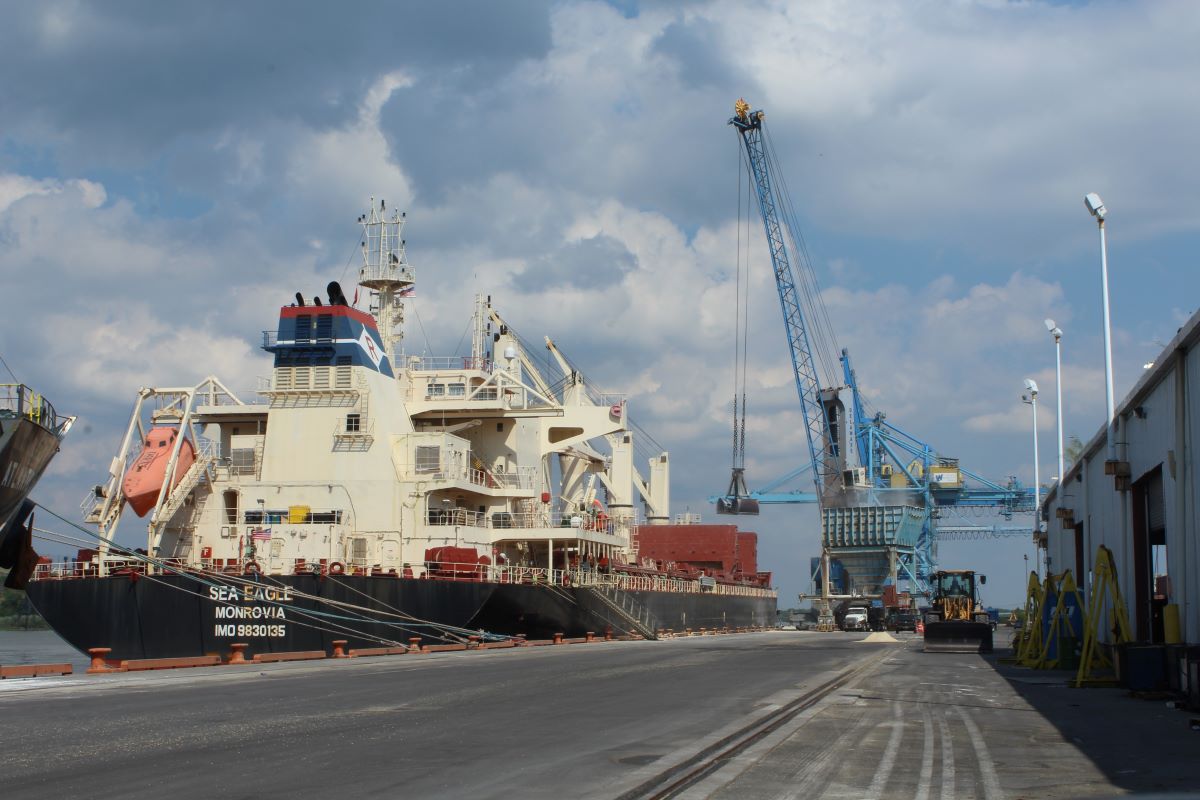-
 play_arrow
play_arrow
Radio Rehoboth
Federal judge revokes permits for key piece to Port Wilmington’s future



The ruling is a major setback for the Diamond State Port Corporation and Enstructure’s plans to transform the former Chemours plant into a state-of-the-art container port near the Port of Wilmington. | DBT PHOTO BY KATIE TABLEING
WILMINGTON — A federal judge ruled earlier this week that the U.S. Army Corps of Engineers violated the law and did not fully consider the impact of Delaware’s proposed Edgemoor container port on the north side of the Christiana River.
U.S. District Judge Mark Kearney of Eastern District of Pennsylvania ruled in favor of three Philadelphia Port operators and vacated the dredging and construction permitted by the Army Corps to make way for a new container port 30 miles down the river.
Kearney wrote that the Army Corps had “arbitrary and capriciously” departed from its own procedures by not requiring Delaware officials to secure a statement of no objection from Philadelphia Regional Port Authority(PhilaPort) as the only non-federal sponsor of the project when recommending project approval.
The ruling is a major setback for the Diamond State Port Corporation and Enstructure’s hopes to develop the former Chemours plant into a state-of-the-art container port which rests just a mile north of Port Wilmington where the Delaware and Christina Rivers meet. The project has an estimated price tag of $500 million and has $120 million committed through federal grants and portions of Delaware’s share of the American Rescue Plan Act funds.
If realized, the Edgemoor port would boost traffic for container vessels by 55% and bring $383 million per year in economic impact to the state’s economy, according to documents filed in the Eastern District of Pennsylvania. It’s also integral to the state’s dreams of two terminals in “Port Delaware,’ a proposal that would also see millions invested in the Port of Wilmington and create one of the largest employment centers in the state.
Ever since the Diamond State Port Corporation bought the former Chemours plant for the new terminal in 2017, however, it has raised arguments from other port terminals nearby that it would cut into the existing business that sails up the river. The Edgemoor port would be 25 miles closer than the Port of Philadelphia and, once built, it would have 1.2 million twenty-foot equivalent units.
Port of Wilmington’s annual container volume is estimated at 215,000 20-foot containers and it’s hamstrung by its channel depth as larger containers need at least a depth of 45 feet to navigate. In comparison, Port Philadelphia’s annual container volume is more than three times that.
PhilaPort and the Holt Logistics Corp., whose affiliates operate terminals in Philadelphia and South Jersey, had filed the lawsuit against the Diamond State Port Corporation last year, claiming that the process for the permit approval had not been fairly scrutinized. The Philadelphia port also claimed that the Army Corps failed to consider how the Edgemoor proposal would also impact the Delaware River Deepening Project – which would deepen the river to benefit Philadelphia ports.
Kearney wrote in his opinion that the Army Corps did not engage in “reasoned decision making” on dredging and the project, since it failed to consider the impact dredging may have on the public from a safety and navigation perspective.
In particular, the judge noted that the Diamond State Port Corporation had cited outside maritime traffic data that limited consideration to traffic to large vessels as well as using four-year old data — and that data was used by the Army Corps for its permit approval.
“Commenters raised concerns to the Corps about traffic resulting from use of the turning basin. The Corps had an independent obligation to ensure the soundness and reliability of studies and data it relied upon through Diamond State in concluding there would be no impacts to navigation,” Kearny wrote in his opinion.
“The Corps did not carry out these duties when responding to comments about the deficiencies in the feasibility study and further studies which might be required,” the judge continued. “The Corps either adopted Diamond State’s dismissals without explanation or provided a response which simply concluded there were no impacts.”
Go to Source:https://delawarebusinesstimes.com/news/federal-port-wilmingtons-future/
Author: Katie Tabeling
Written by: RSS
Similar posts
-

Daybreak Morning Show
Hosted by Jeff Balk
Join Jeff Balk for all the news and information you need to know to start your day and enjoy your stay in Rehoboth Beach, Dewey Beach and the Lewes areas with special featured guests from our non-profits, businesses and art communities.
close Chart
Top popular

News Briefs 10/17/23
Board of Commissioners Workshop & Special Meeting – November 6

Six Sussex road projects considered in latest CTP
Knicks vs. Cavaliers prediction, odds, line, spread, time: 2023 NBA picks, Nov. 1 best bets from proven model
NFL Week 17 highlights: Packers, 49ers, Saints, Steelers win, Cardinals stun Eagles
Copyright 2023 East Sussex Public Broadcasting, Inc.




